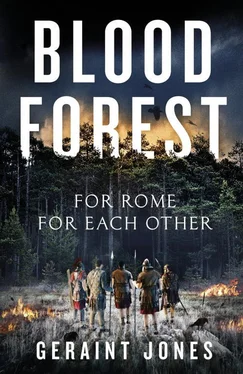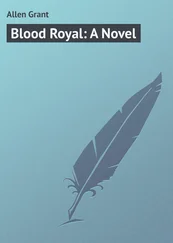Geraint Jones - Blood Forest
Здесь есть возможность читать онлайн «Geraint Jones - Blood Forest» весь текст электронной книги совершенно бесплатно (целиком полную версию без сокращений). В некоторых случаях можно слушать аудио, скачать через торрент в формате fb2 и присутствует краткое содержание. Город: London, Год выпуска: 2017, ISBN: 2017, Издательство: Michael Joseph, Жанр: Историческая проза, на английском языке. Описание произведения, (предисловие) а так же отзывы посетителей доступны на портале библиотеки ЛибКат.
- Название:Blood Forest
- Автор:
- Издательство:Michael Joseph
- Жанр:
- Год:2017
- Город:London
- ISBN:978-1-405-92778-9
- Рейтинг книги:4 / 5. Голосов: 1
-
Избранное:Добавить в избранное
- Отзывы:
-
Ваша оценка:
- 80
- 1
- 2
- 3
- 4
- 5
Blood Forest: краткое содержание, описание и аннотация
Предлагаем к чтению аннотацию, описание, краткое содержание или предисловие (зависит от того, что написал сам автор книги «Blood Forest»). Если вы не нашли необходимую информацию о книге — напишите в комментариях, мы постараемся отыскать её.
Blood Forest — читать онлайн бесплатно полную книгу (весь текст) целиком
Ниже представлен текст книги, разбитый по страницам. Система сохранения места последней прочитанной страницы, позволяет с удобством читать онлайн бесплатно книгу «Blood Forest», без необходимости каждый раз заново искать на чём Вы остановились. Поставьте закладку, и сможете в любой момент перейти на страницу, на которой закончили чтение.
Интервал:
Закладка:
‘I can’t kill you.’ The prince shook his head out of sympathy. ‘But our journey together ends now.’ He turned to Berengar. ‘Put him with the other common soldiers,’ he ordered in Latin, and then turned back to face me, the blue of his eyes alight with bitter disappointment. ‘You had your chance to stand with me, my friend. It hurts me that you turn your back now, when our work has begun, but I cannot kill you for it. As you refuse to throw off the chains of Rome, you will become a slave, Corvus. It pains me, but you will become a slave.’
I could see that his words were heartfelt. So too were my own. ‘Fuck you,’ I spat.
Berengar’s huge backhand swatted me a split second later, and I rolled on to my face in the filth. When I looked up, Arminius was gone.
Two German warriors pulled me to my feet and shoved me in the direction of the herded Roman soldiers. I swear I could almost smell the panic.
‘Here, brother,’ a veteran of the Nineteenth Legion offered, helping me to my feet once the tribesmen had dumped me. ‘You talked to their leader.’ There was astonishment in his voice.
I wiped blood from my mouth. Berengar’s blow had knocked free a tooth. ‘Yes,’ I managed, and felt accusing stares from the soldiers about me. Those who could still care. I had to cover myself. ‘I knew him from Pannonia, when I served with the Eighth.’
The explanation did something to dispel the suspicion, and the troops withdrew into their own misery. Exhausted and fearful, the mass of men were silent but for the ever-present chorus of muttered prayers, curses and crying.
I had no wish to be idle. I had left Titus and chests of coin to find my friends, and so I called out: ‘Second Cohort, Seventeenth Legion? Second Cohort, Seventeenth?’ I repeated, and looked at the German warriors who acted as our wardens. They showed little interest in me. Unarmed and emaciated as I was, that was no wonder. I was not a threat.
‘Second Cohort, Seventeenth Legion?’ I shouted again.
‘Over here!’ came back from behind the wall of men.
I pushed my way through the soldiers towards the voice, calling again, and was answered.
‘Second Century,’ I greeted the man whose eyes sought me out.
‘Fourth,’ he acknowledged with a grunt. ‘Have you seen any of my boys?’ he asked, daring to hope that some of his comrades yet lived.
I shook my head, and asked him the same.
‘Over there.’ He jabbed a thumb across his shoulder.
I gave the man my thanks and pushed hastily on, stepping over men who had collapsed from exhaustion. Despite their proximity to death and their imminent enslavement, some even snored in the mud.
‘Second Century, Second Co—’ I began.
‘Felix!’ A plaintive voice cut me off. ‘Felix!’
I half turned and saw Stumps struggle to pick himself up from the dirt. My heart beat faster to see him, and I pulled the soldier into a tight embrace.
I wanted to say something – I’m sure that he wanted to say the same things – but neither of us spoke. How could we? A look was enough. A look to confirm that, despite the misery and the horror, we still had a brother amongst the chaos.
‘Titus?’ he asked finally, swallowing in anticipation.
I could not speak. Stumps was already battered emotionally and physically to the edge of his limits and beyond, as every man was. If he knew that Titus, his leader, his friend, had abandoned him…
‘Dead,’ I muttered. ‘Titus is dead.’
The soldier dropped his head on to my shoulder, trying to weep tears from eyes that had long since run dry.
‘Titus, Chicken, Rufus, the boy,’ he choked. ‘I don’t know where Moon is, Felix. I don’t know where he is, or Micon. I think they’re dead. I think they’re all dead.’
‘There’s hope,’ I promised him, and meant it.
How could I feel that way? Strewn across the forest was the carcass of three legions. The soldiers’ bodies were condemned to be pulled apart by animals, their bones bleached by sun and rain. It was the worst defeat a Roman army had suffered in longer than living memory, and I knew that Arminius would not stop here. This battle was a statement of intent, a declaration that Rome was not invincible. It was the beginning of an age of war.
And what would be my part in it? Which mask would I wear? Which standard would I carry? For Rome I had been a soldier, and called a hero. Against her, I had been a turncoat, and a rebel. Wherever I had marched, death had followed.
But now I was a slave.
‘On your feet!’ a German voice called in thick Latin. ‘On your feet!’
Somehow, the walking dead obeyed.
‘That way! Move! Go!’
And so we marched, leaving the blood forest behind us, the thousands of corpses lining the route as if it were a parade of nightmare. Besides me, Stumps began to whimper.
‘They’re all dead,’ I heard him mumble between sobs.
Were they dead? Most likely. Even Titus, force of nature that he was, would struggle to survive alone in this hostile place. Chickenhead, a man who had grown to be my friend, would rot beneath the German wall. Rufus was lost to the forest, as was young Cnaeus, but try as I might, my battered mind could not mourn them now. Instead, I envied them.
I envied them, because as we shuffled our way north towards the German hinterland, the terrifying weight of my position came crashing down, and I knew that no battle, no forest, could be as terrible as the torment I was soon to suffer.
For I was a slave.
Author’s Note
I’m not sure when I first became interested in the Battle of the Teutoburg Forest – as the decimation of Varus’s army is known – but I do remember Adrian Murdoch’s Rome’s Greatest Defeat accompanying me to Basra when the insurgency there was in full bloom. Through books like Murdoch’s I began to see how Varus’s campaign was an ancient echo of the one I found myself involved in. Where a supposedly superior force – of a supposedly advanced culture – was bloodied at the hands of an enemy they had underestimated, in a land that was unconquered, and amidst a people they did not understand. For me, Iraq seemed to be a case of history repeating itself, and I felt an affinity to those ancient foot soldiers who would have trodden the dense German forests with as little familiarity as I paced a desert city.
As far as military disasters go, Varus’s defeat ranks alongside Stalingrad as a pivotal moment in history that echoed far beyond the local borders. Stalingrad signalled the end of Hitler’s dreams of expansion eastwards, and so too did the loss of three legions mark the end of Rome’s attempts to conquer German lands east of the Rhine. Who knows how the Empire would have grown with that powerful fighting force intact and in capable hands.
The scale of the loss of Varus’s army cannot be overstated. Forgetting for a moment the thousands of unfortunate auxiliary soldiers that were lost, the might of three legions was wiped out in a matter of days. There were twenty-eight legions active at the time of the massacre, and so Arminius’s victory deprived Emperor Augustus of more than ten per cent of his heavy infantry. Ten per cent of the soldiers that were the lynchpin of the Roman Empire both in attack and defence. Furthermore, Varus’s defeat came on the heels of a war in Pannonia that had bled the legions viciously, and so it was little wonder that the news of the German victory caused such panic in Rome; able-bodied men were pressed into service, whilst slaves were freed and formed into cohorts sent urgently to bolster the Rhine garrisons.
Blood Forest features several characters that were known to history at this time. The first, Governor Varus, I have presented as I found him. Then, as now, army leaders were not necessarily the greatest soldiers or even expert tacticians. Birth and political connections played a huge part in appointments, and Varus seems to have been totally outmatched in leadership by his enemy, Arminius, whose conduct of battles as well as his ability to band together an alliance of tribes, showed great strategic capability as well as prowess on the battlefield.
Читать дальшеИнтервал:
Закладка:
Похожие книги на «Blood Forest»
Представляем Вашему вниманию похожие книги на «Blood Forest» списком для выбора. Мы отобрали схожую по названию и смыслу литературу в надежде предоставить читателям больше вариантов отыскать новые, интересные, ещё непрочитанные произведения.
Обсуждение, отзывы о книге «Blood Forest» и просто собственные мнения читателей. Оставьте ваши комментарии, напишите, что Вы думаете о произведении, его смысле или главных героях. Укажите что конкретно понравилось, а что нет, и почему Вы так считаете.












